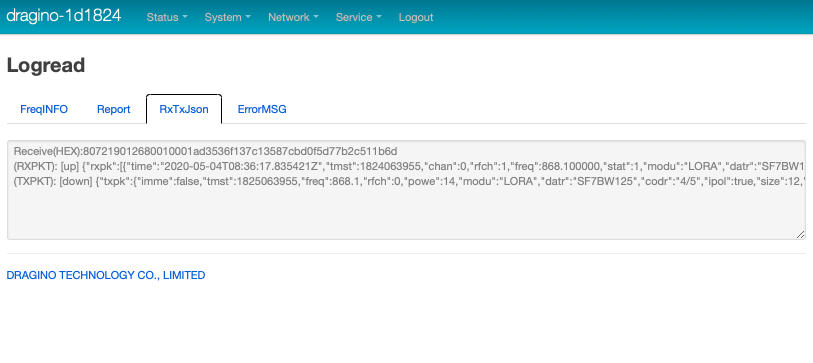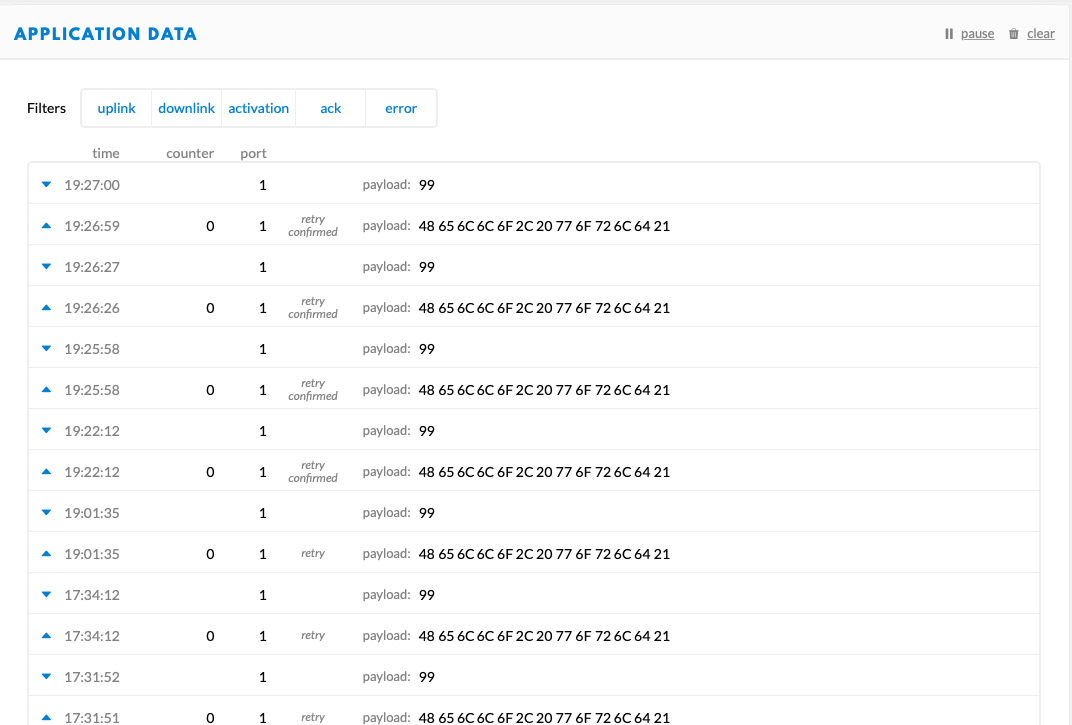Yes
Ehm… it’s a dual channel abomination, Dragino lg02… I was doing this project with my University but due to the covid lockdown I wasn’t able to reach that anymore, the region where I live was not covered by ttn and I was hoping that lgo2 was enough for test my node and than use that with my university region’s gateway.
Searching in the ‘gateway’ log only packet that I see on ttn console appear.
I made new testing, it seems that the node work correctly at the start:
10:35:39.517 -> Starting
10:35:39.517 -> RXMODE_RSSI
10:35:39.517 -> txCnt :0
10:35:39.517 -> 9607: engineUpdate, opmode=0x808
10:35:39.517 -> 9641: EV_TXSTART
10:35:39.517 -> 9709: TXMODE, freq=867700000, len=26, SF=7, BW=125, CR=4/5, IH=0
10:35:39.552 -> Packet queued
10:35:40.604 -> start single rx: now-rxtime: 4
10:35:40.604 -> 75956: RXMODE_SINGLE, freq=867700000, SF=7, BW=125, CR=4/5, IH=0
10:35:40.604 -> rxtimeout: entry: 76484 rxtime: 75949 entry-rxtime: 535 now-entry: 4 rxtime-txend: 62375
10:35:41.576 -> start single rx: now-rxtime: 4
10:35:41.576 -> 138456: RXMODE_SINGLE, freq=869525000, SF=9, BW=125, CR=4/5, IH=0
10:35:41.609 -> rxtimeout: entry: 140264 rxtime: 138449 entry-rxtime: 1815 now-entry: 4 rxtime-txend: 124875
10:35:41.609 -> 140282: EV_TXCOMPLETE (includes waiting for RX windows)
10:35:41.643 -> 140394: engineUpdate, opmode=0x900
10:36:11.604 -> txCnt :1
10:36:11.604 -> 2015395: engineUpdate, opmode=0x908
10:36:11.638 -> 2015417: EV_TXSTART
10:36:11.638 -> 2015482: TXMODE, freq=867900000, len=26, SF=7, BW=125, CR=4/5, IH=0
10:36:11.638 -> Packet queued
10:36:12.669 -> start single rx: now-rxtime: 4
10:36:12.669 -> 2081729: RXMODE_SINGLE, freq=867900000, SF=7, BW=125, CR=4/5, IH=0
10:36:12.703 -> rxtimeout: entry: 2082257 rxtime: 2081722 entry-rxtime: 535 now-entry: 4 rxtime-txend: 62375
10:36:13.691 -> start single rx: now-rxtime: 4
10:36:13.691 -> 2144229: RXMODE_SINGLE, freq=869525000, SF=9, BW=125, CR=4/5, IH=0
10:36:13.691 -> rxtimeout: entry: 2146037 rxtime: 2144222 entry-rxtime: 1815 now-entry: 4 rxtime-txend: 124875
10:36:13.725 -> 2146055: engineUpdate, opmode=0x908
10:36:17.773 -> 2400373: engineUpdate, opmode=0x108
10:36:17.773 -> 2400394: EV_TXSTART
10:36:17.773 -> 2400459: TXMODE, freq=868100000, len=26, SF=7, BW=125, CR=4/5, IH=0
10:36:18.832 -> start single rx: now-rxtime: 4
10:36:18.832 -> 2466706: RXMODE_SINGLE, freq=868100000, SF=7, BW=125, CR=4/5, IH=0
10:36:18.832 -> rxtimeout: entry: 2467234 rxtime: 2466699 entry-rxtime: 535 now-entry: 4 rxtime-txend: 62375
10:36:19.831 -> start single rx: now-rxtime: 4
10:36:19.831 -> 2529206: RXMODE_SINGLE, freq=869525000, SF=9, BW=125, CR=4/5, IH=0
10:36:19.868 -> rxtimeout: entry: 2531014 rxtime: 2529199 entry-rxtime: 1815 now-entry: 4 rxtime-txend: 124875
10:36:19.868 -> 2531031: engineUpdate, opmode=0x908
10:36:23.936 -> 2785351: engineUpdate, opmode=0x108
10:36:23.936 -> 2785371: EV_TXSTART
10:36:23.936 -> 2785437: TXMODE, freq=868300000, len=26, SF=8, BW=125, CR=4/5, IH=0
10:36:25.042 -> start single rx: now-rxtime: 4
10:36:25.042 -> 2854898: RXMODE_SINGLE, freq=868300000, SF=8, BW=125, CR=4/5, IH=0
10:36:25.074 -> rxtimeout: entry: 2855811 rxtime: 2854892 entry-rxtime: 919 now-entry: 4 rxtime-txend: 62375
10:36:26.042 -> start single rx: now-rxtime: 4
10:36:26.042 -> 2917398: RXMODE_SINGLE, freq=869525000, SF=9, BW=125, CR=4/5, IH=0
10:36:26.075 -> rxtimeout: entry: 2919207 rxtime: 2917392 entry-rxtime: 1815 now-entry: 4 rxtime-txend: 124875
10:36:26.075 -> 2919228: engineUpdate, opmode=0x908
10:36:35.250 -> 3491928: engineUpdate, opmode=0x108
10:36:35.250 -> 3491948: EV_TXSTART
10:36:35.250 -> 3492014: TXMODE, freq=868500000, len=26, SF=8, BW=125, CR=4/5, IH=0
10:36:36.354 -> start single rx: now-rxtime: 4
10:36:36.354 -> 3561476: RXMODE_SINGLE, freq=868500000, SF=8, BW=125, CR=4/5, IH=0
10:36:36.354 -> rxtimeout: entry: 3562388 rxtime: 3561469 entry-rxtime: 919 now-entry: 4 rxtime-txend: 62375
10:36:37.370 -> start single rx: now-rxtime: 4
10:36:37.370 -> 3623975: RXMODE_SINGLE, freq=869525000, SF=9, BW=125, CR=4/5, IH=0
10:36:37.370 -> rxtimeout: entry: 3625784 rxtime: 3623969 entry-rxtime: 1815 now-entry: 4 rxtime-txend: 124875
10:36:37.404 -> 3625801: engineUpdate, opmode=0x908
10:36:46.550 -> 4198506: engineUpdate, opmode=0x108
10:36:46.550 -> 4198526: EV_TXSTART
10:36:46.550 -> 4198592: TXMODE, freq=867100000, len=26, SF=9, BW=125, CR=4/5, IH=0
10:36:47.755 -> start single rx: now-rxtime: 4
10:36:47.755 -> 4273846: RXMODE_SINGLE, freq=867100000, SF=9, BW=125, CR=4/5, IH=0
10:36:47.790 -> rxtimeout: entry: 4275654 rxtime: 4273839 entry-rxtime: 1815 now-entry: 4 rxtime-txend: 62375
10:36:48.751 -> start single rx: now-rxtime: 4
10:36:48.751 -> 4336345: RXMODE_SINGLE, freq=869525000, SF=9, BW=125, CR=4/5, IH=0
10:36:48.784 -> rxtimeout: entry: 4338154 rxtime: 4336339 entry-rxtime: 1815 now-entry: 4 rxtime-txend: 124875
10:36:48.784 -> 4338171: engineUpdate, opmode=0x908
10:37:07.114 -> 5484284: engineUpdate, opmode=0x108
10:37:07.114 -> 5484305: EV_TXSTART
10:37:07.114 -> 5484370: TXMODE, freq=867300000, len=26, SF=9, BW=125, CR=4/5, IH=0
10:37:08.311 -> start single rx: now-rxtime: 4
10:37:08.346 -> 5559625: RXMODE_SINGLE, freq=867300000, SF=9, BW=125, CR=4/5, IH=0
10:37:08.346 -> rxtimeout: entry: 5561433 rxtime: 5559618 entry-rxtime: 1815 now-entry: 4 rxtime-txend: 62375
10:37:09.326 -> start single rx: now-rxtime: 4
10:37:09.326 -> 5622124: RXMODE_SINGLE, freq=869525000, SF=9, BW=125, CR=4/5, IH=0
10:37:09.359 -> rxtimeout: entry: 5623933 rxtime: 5622118 entry-rxtime: 1815 now-entry: 4 rxtime-txend: 124875
10:37:09.359 -> 5623951: engineUpdate, opmode=0x908
10:37:27.705 -> 6770062: engineUpdate, opmode=0x108
10:37:27.705 -> 6770083: EV_TXSTART
10:37:27.705 -> 6770149: TXMODE, freq=867500000, len=26, SF=10, BW=125, CR=4/5, IH=0
10:37:29.102 -> start single rx: now-rxtime: 3
10:37:29.102 -> 6858266: RXMODE_SINGLE, freq=867500000, SF=10, BW=125, CR=4/5, IH=0
10:37:29.169 -> rxtimeout: entry: 6861867 rxtime: 6858260 entry-rxtime: 3607 now-entry: 3 rxtime-txend: 62375
10:37:30.092 -> start single rx: now-rxtime: 3
10:37:30.092 -> 6920766: RXMODE_SINGLE, freq=869525000, SF=9, BW=125, CR=4/5, IH=0
10:37:30.126 -> rxtimeout: entry: 6922575 rxtime: 6920760 entry-rxtime: 1815 now-entry: 3 rxtime-txend: 124875
10:37:30.126 -> 6922596: engineUpdate, opmode=0x908
10:38:08.847 -> 9342440: engineUpdate, opmode=0x108
10:38:08.847 -> 9342460: EV_TXSTART
10:38:08.847 -> 9342525: TXMODE, freq=867700000, len=26, SF=10, BW=125, CR=4/5, IH=0
10:38:21.856 -> start single rx: now-rxtime: 3
10:38:21.856 -> 9430643: RXMODE_SINGLE, freq=867700000, SF=10, BW=125, CR=4/5, IH=0
10:38:21.856 -> rxtimeout: entry: 9434244 rxtime: 9430637 entry-rxtime: 3607 now-entry: 3 rxtime-txend: 62375
10:38:21.856 -> start single rx: now-rxtime: 3
10:38:21.856 -> 9493143: RXMODE_SINGLE, freq=869525000, SF=9, BW=125, CR=4/5, IH=0
10:38:21.856 -> rxtimeout: entry: 9494952 rxtime: 9493137 entry-rxtime: 1815 now-entry: 3 rxtime-txend: 124875
10:38:21.856 -> 9494969: EV_TXCOMPLETE (includes waiting for RX windows)
10:38:21.856 -> 9495098: engineUpdate, opmode=0x900
10:38:41.291 -> txCnt :2
10:38:41.291 -> 11370099: engineUpdate, opmode=0x908
10:38:41.291 -> Packet queued
10:38:49.999 -> 11914817: engineUpdate, opmode=0x108
10:38:49.999 -> 11914838: EV_TXSTART
10:38:49.999 -> 11914904: TXMODE, freq=867900000, len=26, SF=10, BW=125, CR=4/5, IH=0
10:38:51.432 -> start single rx: now-rxtime: 3
10:38:51.432 -> 12003021: RXMODE_SINGLE, freq=867900000, SF=10, BW=125, CR=4/5, IH=0
10:38:51.466 -> rxtimeout: entry: 12006622 rxtime: 12003015 entry-rxtime: 3607 now-entry: 4 rxtime-txend: 62375
10:38:52.422 -> start single rx: now-rxtime: 3
10:38:52.422 -> 12065521: RXMODE_SINGLE, freq=869525000, SF=9, BW=125, CR=4/5, IH=0
10:38:52.456 -> rxtimeout: entry: 12067330 rxtime: 12065515 entry-rxtime: 1815 now-entry: 3 rxtime-txend: 124875
10:38:52.456 -> 12067347: engineUpdate, opmode=0x908
10:39:31.174 -> 14487195: engineUpdate, opmode=0x108
10:39:31.174 -> 14487216: EV_TXSTART
10:39:31.174 -> 14487281: TXMODE, freq=868100000, len=26, SF=10, BW=125, CR=4/5, IH=0
10:39:32.591 -> start single rx: now-rxtime: 3
10:39:32.591 -> 14575398: RXMODE_SINGLE, freq=868100000, SF=10, BW=125, CR=4/5, IH=0
10:39:32.627 -> rxtimeout: entry: 14578999 rxtime: 14575392 entry-rxtime: 3607 now-entry: 3 rxtime-txend: 62375
10:39:33.593 -> start single rx: now-rxtime: 3
10:39:33.593 -> 14637898: RXMODE_SINGLE, freq=869525000, SF=9, BW=125, CR=4/5, IH=0
10:39:33.593 -> rxtimeout: entry: 14639707 rxtime: 14637892 entry-rxtime: 1815 now-entry: 3 rxtime-txend: 124875
10:39:33.627 -> 14639724: engineUpdate, opmode=0x908
10:40:12.310 -> 17059573: engineUpdate, opmode=0x108
10:40:12.310 -> 17059594: EV_TXSTART
10:40:12.344 -> 17059659: TXMODE, freq=868300000, len=26, SF=11, BW=125, CR=4/5, IH=0
10:40:14.137 -> start single rx: now-rxtime: 4
10:40:14.137 -> 17173505: RXMODE_SINGLE, freq=868300000, SF=11, BW=125, CR=4/5, IH=0
10:40:14.271 -> rxtimeout: entry: 17180689 rxtime: 17173498 entry-rxtime: 7191 now-entry: 4 rxtime-txend: 62375
10:40:15.148 -> start single rx: now-rxtime: 4
10:40:15.148 -> 17236005: RXMODE_SINGLE, freq=869525000, SF=9, BW=125, CR=4/5, IH=0
10:40:15.185 -> rxtimeout: entry: 17237813 rxtime: 17235998 entry-rxtime: 1815 now-entry: 4 rxtime-txend: 124875
10:40:15.185 -> 17237834: engineUpdate, opmode=0x908
on ttn console I see that only 10:36:17 packet is received, and in gateway is the only packet that appear



